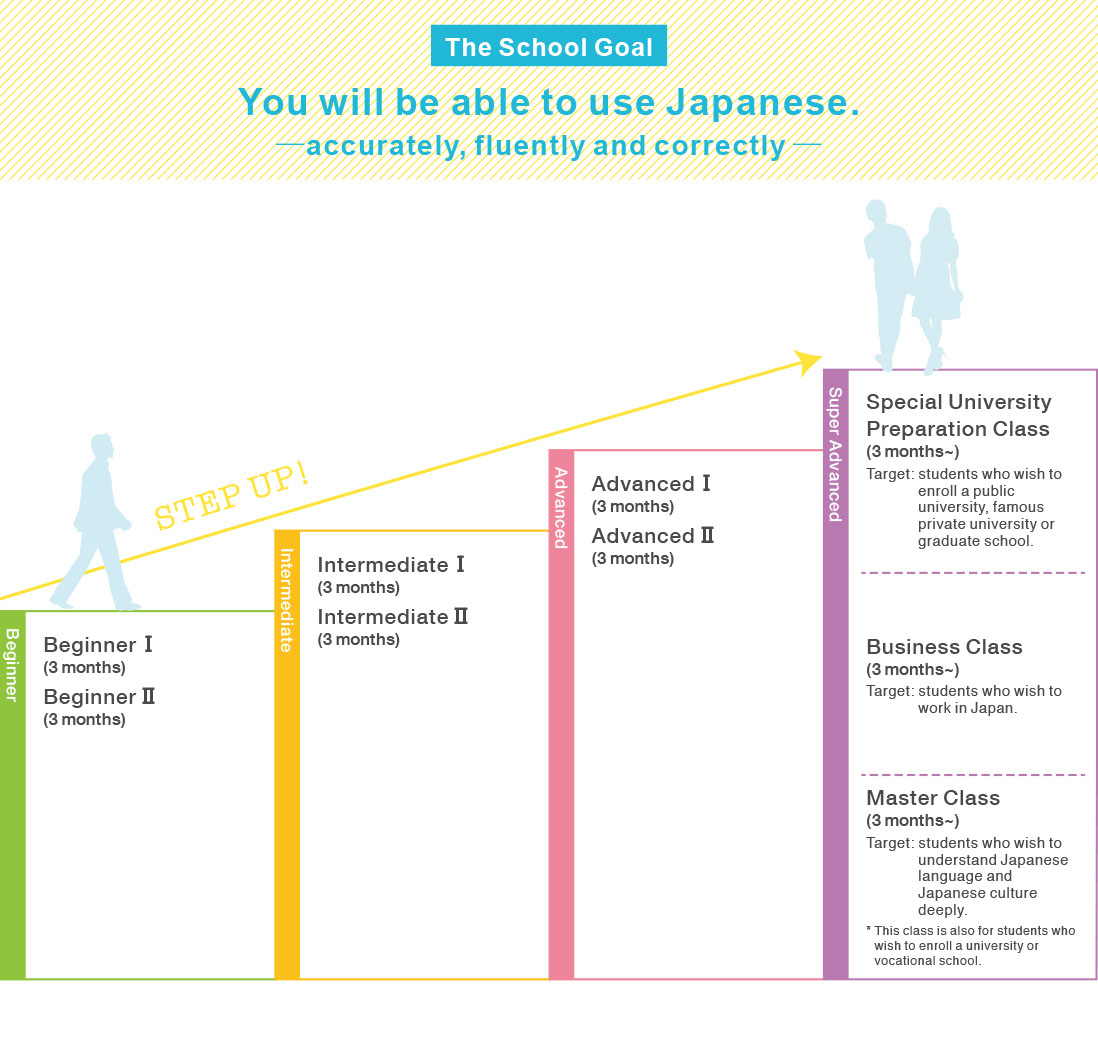
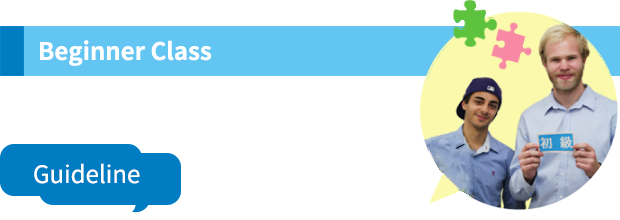
| Subject | Details | |
|---|---|---|
| Language Knowledge | (1)Grammar | Students study the structure of Japanese language and basic sentence pattern (e.g., Must / Have to~) |
| (2)Vocabulary |
Learn approximately 200 Kanjis while being aware of the ground rules of Kanji. In addition, you will learn the minimum vocabulary (e.g., gentle, young people) necessary to understand the structure of Japanese and communicate in Japanese. |
|
| Ability | (3)Listening | Listen to conversations about familiar topics (e.g., your eating habits) at a speed suitable for Japanese learners, and practise listening to the details and understanding outline. |
| (4)Reading | Read phrases on familiar topics (e.g., eating habits) and practice understanding the outline of what they say. | |
| (5)Conversation | Practice continuing a question-and-answer conversation about familiar topics (e.g., your eating habits). | |
| Monday | Tuesday | Wednesday | Thursday | Friday |
|---|---|---|---|---|
| Vocabulary/Grammar | Vocabulary/Grammar | Vocabulary/Grammar | Vocabulary/Grammar | Vocabulary/Grammar |
| Listening/Conversation | Listening/Conversation | Listening/Conversation | Listening/Conversation | Reading |
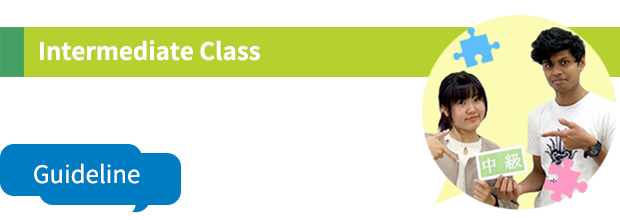
| Subject | Details | |
|---|---|---|
| Language Knowledge | (1)Grammar |
Students will learn sentence patterns (e.g., you can't help) that are often used not only in spoken language, but also in written language and are necessary for detailed representation. |
| (2)Vocabulary |
Learn approximately 300 Kanjis while being aware of the ground rules of Kanji. In addition, you will learn sentence patterns (e.g., gentle, young people) that are often used not only in spoken language, but also in written language and are necessary for detailed representation. |
|
| Ability | (3)Listening | Listen to explanations on various topics (e.g., characteristics of Japanese cuisine) at a speed close to natural speed, and practice listening to details and understanding the outline of what they say. |
| (4)Reading | Read sentences that explain various topics (e.g., characteristics of Japanese cuisine) and practice understanding the details while being aware of the relation between sentences. | |
| (5)Conversation | Practice speaking with a structure that is easy to understand in order to explain various topics (e.g., characteristics of Japanese cuisine). | |
| (6)Composition | Practice writing with an easy-to-understand structure in mind to be able to explain different topics (e.g., characteristics of Japanese cuisine). | |
| Monday | Tuesday | Wednesday | Thursday | Friday |
|---|---|---|---|---|
| Vocabulary/Grammar | Vocabulary/Grammar | Vocabulary/Grammar | Vocabulary/Grammar | Composition |
| Reading | Conversation | Listening | Reading | Conversation |
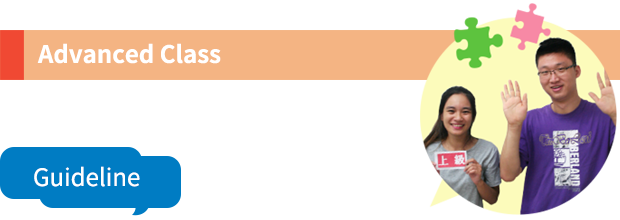
| Subject | Details | |
|---|---|---|
| Language Knowledge | (1)Grammar | Students will learn written language and sentence patterns (e.g., you will be forced to do) necessary for conversation in formal situations. |
| (2)Vocabulary |
Learn approximately 500Kanjis while being aware of the ground rules of Kanji. Students will also learn the vocabulary necessary for language writing and conversation in formal situations (e.g., tolerant, youth). |
|
| Ability | (3)Listening | Listen to opinions on highly abstract issues (e.g., food self-sufficiency) at a natural pace, practice listening to details and understanding outlines and detailed meaning. |
| (4)Reading | Read sentences that provide opinions on highly abstract subjects (e.g., food self-sufficiency) and practice understanding the details, being aware of the relationship between paragraphs. | |
| (5)Conversation | Practice speaking with the awareness to provide supporting information from different perspectives so that opinions on highly abstract topics (e.g., food self-sufficiency) can be expressed. | |
| (6)Composition | Practice writing knowing you are providing supporting information from a variety of angles so that opinions on highly abstract topics (e.g., food self-sufficiency) can be expressed. | |
| Monday | Tuesday | Wednesday | Thursday | Friday |
|---|---|---|---|---|
| Vocabulary/Grammar | Reading | Vocabulary/Grammar | Reading | Vocabulary/Grammar |
| Conversation | Listening | Composition | Conversation | Listening |
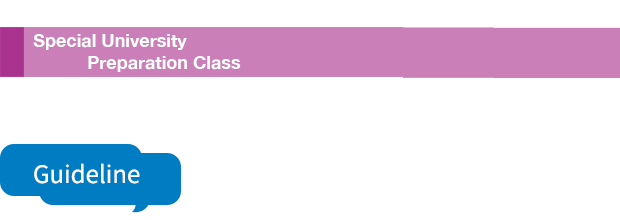
| Subject | Details | |
|---|---|---|
| Language Knowledge | (1)Grammar | Not only accurately use the expressions learned up to the advanced level (e.g., I'm going to do-I'm going to do) for report creation and presentation at Japanese universities, but also understand the nuances of each expression. Then practice applying them correctly. |
| (2)Vocabulary | For the creation and presentation of reports in Japanese universities, students will practice the correct use of N1 and N2 Kanji, vocabulary (e.g., enhancement) by understanding the nuances of each expression. | |
| Ability | (3)Listening | In order to understand the lessons in Japanese universities, students will listen to lecture-style speech and practice note taking. Also, students practice listening and understanding news about social issues. |
| (4)Reading | In order to understand the lessons at universities in Japan, students practice understanding logical and complicated sentences. | |
| (5)Conversation | Students analyse the frequently asked questions in the interview and practice them repeatedly. Students also practice exchanging opinions on social issues to exchange opinions with professors and classmates. | |
| (6)Composition | In order to create and present reports at Japanese universities, students practice organizing assignments and expressing their opinions based on logical reasoning. | |
| Others | (7)Measures for certification | In order to get a high score in EJU and JLPT, which are necessary for taking exams at Japanese universities, etc., students will work on exercises, know the tendency of the exam, and get the knack for solving the questions efficiently and accurately. |
| Monday | Tuesday | Wednesday | Thursday | Friday |
|---|---|---|---|---|
| Vocabulary | Vocabulary | Vocabulary | Vocabulary | Vocabulary |
| Measures for certification | Measures for certification | Measures for certification | Measures for certification | Measures for certification |
| Reading | Grammar | Reading | Grammar | Reading |
| Listening | Measures for certification | Conversation | Measures for certification | Listening |
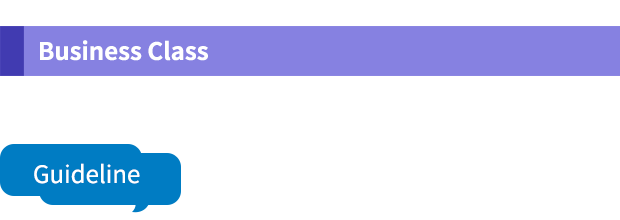
| Subject | Details | |
|---|---|---|
| Japanese Skill | (1)Journalism Reading | In order to gather information and understand business documents, students will read articles in newspapers and magazines to learn commonly used vocabulary and expressions and the background of current affairs. This is because it is important for you to understand it after you start working in Japan. |
| (2)Listening to the news | Students practice listening and understanding the news to gather information and understand business documents. This is because it is important for you to understand it after they start working in Japan. Students will also practice giving the presentation about the news they are interested in and discuss it in class. | |
| (3)BJT Prep. | In order to get a high score in BJT, which is widely used as an index for measuring business Japanese proficiency, students will work on exercises, know the tendency of the exam, and get the knack for solving the questions efficiently and accurately. | |
| Adapting to Japanese society and culture | (4)Business Conversation | To keep work going smoothly, students will practice acquiring communication skills through role-playing in various situations that are often seen in the business situation. Students will also learn the business etiquette that you need to know to get a job in Japan. |
| (5)Social and cultural issue | In order to work smoothly after getting a job in Japan, students will learn about Japanese business culture (for example, the scope of work, a way to think about holidays). | |
| Fundamental Competencies for Working Persons | (6)Job-hunting Prep. | Students will prepare for job hunting (e.g. self-analysis, industry research, company research, preparation of entry sheets / resumes, interview preparation). At the same time, you can learn about the Japanese business society by listening to lectures by people who actually work in the company. Also. Students practice proposing solutions to the problems that companies are now facing. |
| Monday | Tuesday | Wednesday | Thursday | Friday |
|---|---|---|---|---|
|
Job-hunting Prep. ・Career guidance・Practical training (Prep for interview) (Field Study etc.) |
Business Conversation | Journalism Reading | Listening to the news |
Job-hunting Prep. ・Practical training (Presentation of topics from company) |
| Social and cultural issue | BJT Prep. |
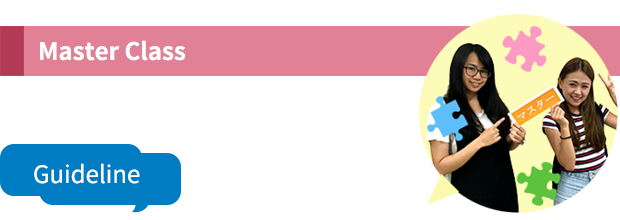
To improve the Japanese level from “good Japanese level as foreigner” to “natural Japanese”. Not only to Students aim not only to be able to use Japanese, but also to be able to use Japanese fluently and appropriately.
Students learn by discussion with Japanese guest speaker or do the field work with other classmates.
| Subject | Details | |
|---|---|---|
| Language Knowledge | (1)Grammar | In order to be able to use Japanese properly like Japanese people, not only use the expressions learned up to the advanced level (e.g., I'm going to do it), but also understand the nuances of each expression. Then practice applying them correctly. |
| (2)Vocabulary | In order to be able to use Japanese properly like Japanese people, students will practice the correct use of N1 and N2 Kanji, vocabulary (e.g., enhancement) by understanding the nuances of each expression. | |
| Ability | (3)Listening | Students will practice listening to and understanding news about social issues so that they can speak Japanese fluently like Japanese people do. |
| (4)Reading | In order to be able to use Japanese properly like Japanese people, students will learn frequently used vocabulary and expressions and the background of current affairs by reading articles and essays in newspapers and magazines. | |
| (5)Conversation | In order to be able to use Japanese fluently like Japanese people, students will practice speaking Japanese in large volume through group tasks and presentations. Also, to use Japanese properly like Japanese people, choose appropriate speech styles (eg honorifics, casually spoken words) according to the relationship with the other person. Practice speaking how to not offend the other person (eg, refuting with respect for the opinions of the other person). | |
| Monday | Tuesday | Wednesday | Thursday | Friday |
|---|---|---|---|---|
| Reading/Conversation | Vocabulary | Reading/Conversation | Grammar | Reading/Conversation |
| Conversation | Listening/Conversation | Conversation | Listening/Conversation | Conversation |
The Class is to learn Japanese language the necessary for living in Japan.

| Subject | Details | |
|---|---|---|
| Language Knowledge | (1)Grammar | Understand the structure of Japanese ・ Learn the minimum sentence patterns (i.e. must be) needed for communication in Japanese. The goal is to acquire the grammar from familiar topics and situation for foreigners who live in Japan. |
| (2)Vocabulary | Learn approximately 200 Kanjis while being aware of the ground rules of Kanji. In addition, student will learn the minimum vocabulary (e.g., gentle, young people) necessary to understand the structure of Japanese and communicate in Japanese. Effectively increase the amount of vocabulary by using picture cards and understanding the meaning of the vocabulary within its context. | |
| Ability | (3)Listening | Listen to conversations about familiar topics (e.g., your eating habits) at a speed suitable for Japanese learners, and practise listening to the details and understanding outline. |
| (4)Conversation | Practice continuing a question-and-answer conversation about familiar topics (e.g., your eating habits). | |
| Monday | Tuesday | Wednesday | Thursday | Friday |
|---|---|---|---|---|
| Conversation (「AAA」) |
Conversation (「AAA」) |
Listening (「歌の聴解」) |
Conversation (「AAA」) |
Conversation (「AAA」) |
| Vocabulary/Grammar | Vocabulary/Grammar | Vocabulary/Grammar | Vocabulary/Grammar | Vocabulary/Grammar |
| Listening/Conversation | Listening/Conversation | Listening/Conversation | Listening/Conversation | Listening/Conversation |

Students aim to learn the linguistic knowledge necessary for detailed depiction, which is often used not only in spoken language, but also in writing, language, and to be able to explain various topics using it.
| Subject | Details | |
|---|---|---|
| Language Knowledge | (1)Grammar | Students will learn sentence patterns (e.g., you can't help) that are often used not only in spoken language, but also in written language and are necessary for detailed representation. The goal is to acquire the grammar from familiar topics and situation for foreigners who live in Japan. |
| (2)Vocabulary | Learn approximately 300 Kanjis while being aware of the ground rules of Kanji. In addition, you will learn sentence patterns (e.g., gentle, young people) that are often used not only in spoken language, but also in written language and are necessary for detailed representation. Effectively increase the amount of vocabulary by using picture cards and understanding the meaning of the vocabulary within its context. | |
| Ability | (3)Listening | Listen to explanations on various topics (e.g., characteristics of Japanese cuisine) at a speed close to natural speed, and practice listening to details and understanding the outline of what they say. |
| (4)Conversation | Read sentences that explain various topics (e.g., characteristics of Japanese cuisine) and practice understanding the details while being aware of the relation between sentences. | |
| Monday | Tuesday | Wednesday | Thursday | Friday |
|---|---|---|---|---|
| Vocabulary/Grammar (「ドラマの日本語」) |
Vocabulary/Grammar (「ドラマの日本語」) |
Listening/Conversation (「できる大阪弁」) |
Vocabulary/Grammar (「ドラマの日本語」) |
Vocabulary/Grammar (「ドラマの日本語」) |
| Listening/Conversation (「ドラマの日本語」) |
Listening/Conversation (「ドラマの日本語」) |
Listening/Conversation (「ドラマの日本語」) |
Listening/Conversation (「ドラマの日本語」) |
|
| Conversation (「3/2/1」など) |
Conversation (「3/2/1」など) |
Conversation (「3/2/1」など) |
Conversation (「3/2/1」など) |
Conversation (「3/2/1」など) |
* We have lots of original learning materials! Such as “Japanese used in dramas -Script-" " Japanese used in dramas -Vocabulary Booklet-" " Japanese used in dramas -Grammar Booklet-" "3/2/1" "Role Play" "Good speakers ♪ Good listener" " You can master Osaka Dialect"

We aim to learn the linguistic knowledge necessary for written language and conversation in formal situations, and use it to give persuasive opinions on highly abstract topics.
| Subject | Details | |
|---|---|---|
| Language Knowledge | (1)Grammar | Students will learn written language and sentence patterns (e.g., you will be forced to do) necessary for conversation in formal situations. The goal is to acquire the grammar from familiar topics and situation for foreigners who live in Japan. |
| (2)Vocabulary | Learn approximately 500 Kanjis while being aware of the ground rules of Kanji. Students will also learn the vocabulary necessary for language writing and conversation in formal situations (e.g., tolerant, youth). Effectively increase the amount of vocabulary by using picture cards and understanding the meaning of the vocabulary within its context. | |
| Ability | (3)Listening | Listen to opinions on highly abstract issues (e.g., food self-sufficiency) at a natural pace, practice listening to details and understanding outline and detailed meaning. |
| (4)Conversation | Read sentences that provide opinions on highly abstract subjects (e.g., food self-sufficiency) and practice understanding the details, being aware of the relationship between paragraphs. | |
| Monday | Tuesday | Wednesday | Thursday | Friday |
|---|---|---|---|---|
| Vocabulary/Grammar (「ドラマの日本語」) |
Vocabulary/Grammar (「ドラマの日本語」) |
Listening/Conversation (「できる大阪弁」) |
Vocabulary/Grammar (「ドラマの日本語」) |
Vocabulary/Grammar (「ドラマの日本語」) |
| Listening/Conversation (「ドラマの日本語」) |
Listening/Conversation (「ドラマの日本語」) |
Listening/Conversation (「ドラマの日本語」) |
Listening/Conversation (「ドラマの日本語」) |
|
| Conversation (「3/2/1」など) |
Conversation (「3/2/1」など) |
Conversation (「3/2/1」など) |
Conversation (「3/2/1」など) |
Conversation (「3/2/1」など) |
* We have lots of original learning materials! Such as “Japanese used in dramas -Script-" " Japanese used in dramas -Vocabulary Booklet-" " Japanese used in dramas -Grammar Booklet-" "3/2/1" "Role Play" "Good speakers ♪ Good listener" " You can master Osaka Dialect"